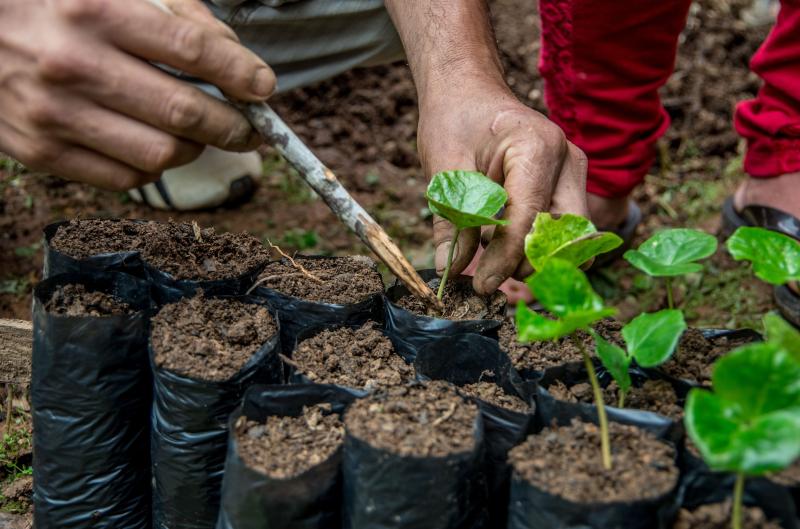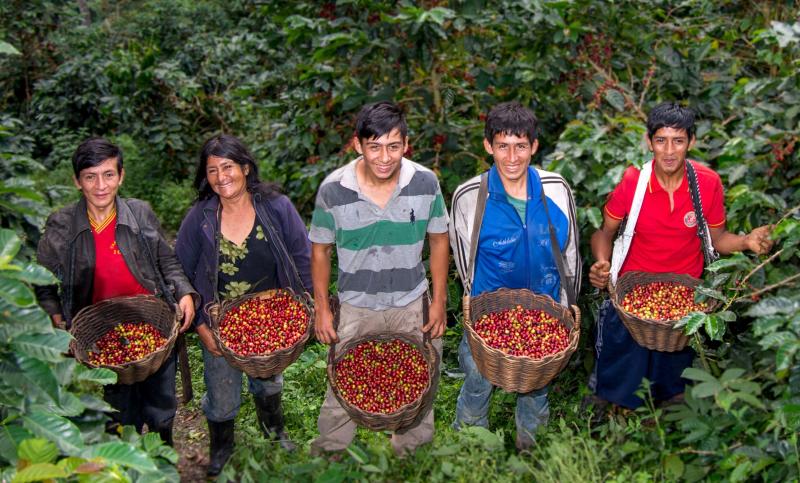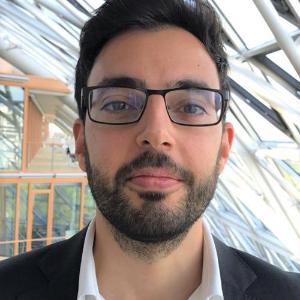In the Amazon forest, coffee can fight land degradation with a fund that helps farmers grow more efficiently and sustainably
By Yusuf Yassin
Like his parents and grandparents before him, Gilbert Carranza Barboza grows coffee in Uctubamba, a province in northern Peru. But Gilbert and hundreds of other smallholders in this part of the Amazon forest struggle to sell enough coffee to make a good living or expand.
To raise their yields and access international markets, Gilbert and his cooperative of 230 local producers joined Café Selva Norte, an agroforestry partnership of several other cooperatives. Café Selva Norte gives loans and advice to farmers who need help managing and restoring degraded land in northern Peru. Gilbert’s cooperative received a loan to build a processing plant and recruit a sales team, giving farmers full control of the coffee-production process. It has also boosted Gilbert’s production fivefold.
Café Selva Norte is operated by Ecotierra, a Canadian company that designs agroforestry projects around the world. The European Investment Bank helps Ecotierra and the Peruvian farmers by investing in the Land Degradation Neutrality Fund, an investment vehicle created by the United Nations and run by the French investment manager Mirova to save damaged land around the world. The European Investment Bank is a cornerstone investor in this fund, along with the Luxembourg government and the French development bank Agence Française de Développement.

Farmers in northern Peru are planting trees for shade and adopting other sustainable practices to save the Amazon and improve their coffee businesses.
Growing sustainable coffee
Working with Ecotierra, Gilbert discovered new ways to improve his business, such as creating more shade for coffee plants. “By being able to plant trees, we can regulate the temperature in our plantations, generate an adequate microclimate for coffee ripening, and at the same time contribute to the sustainability of the planet,” says Gilbert, who is 37.
Gilbert’s annual production has increased five-fold since he started planting trees on his farm. He also now produces high-quality organic coffee, a premium product that brings a higher price.
The Café Selva Norte partnership aims to convert 23,000 hectares of degraded land into productive agroforestry systems, reduce carbon emissions by 1.3 million tonnes a year and improve the lives of 2,400 coffee producers.
Large swathes of the Amazon forest have been destroyed and cleared for farm use. Peru wants to reverse this trend by restoring 3.2 million hectares of degraded land, but it needs outside help.
This is where Ecotierra comes in, with an investment fund it created called Urapi Sustainable Land Use, which gives long-term loans to projects like Café Selva Norte. Urapi gave a $12.7 million loan to Café Selva. Urapi, in turn, received $13 million in funding from the UN’s Land Degradation Neutrality Fund.
Land degradation neutral by 2030
About 30% of land is degraded worldwide, according to the United Nations, and about 12 million hectares of productive land – an area roughly the size of Greece – is degraded every year. This is happening because humans are exploiting land and not investing enough in its protection.
The UN’s Sustainable Development Goal number 15 seeks to combat degradation by restoring damaged land and managing it sustainably. By 2030, the UN hopes land restoration and sustainable land use will outweigh land degradation. This is what the UN refers to as “land degradation neutrality.” Significant investment is needed to meet this goal.

Coffee farmers in northern Peru. The Land Degradation Neutrality Fund is providing financing to help coffee cooperatives protect their land and expand business.
Public and private funding
One way to increase funding is through vehicles like the Land Degradation Neutrality Fund. It was set up to attract more money from the private sector for sustainable land use projects and is one of the few funds that combines public and private money with the Sustainable Development Goals to guide its investments.
Gautier Queru, director of the fund at Mirova, says it invests in projects that restore land and support local communities, while offering a return on investment. The agroforestry project loans are typically repaid through the sale of timber and organic coffee.
In 2016, the European Investment Bank agreed to invest up to $45 million in the fund, while the Luxembourg government pledged €5 million. Support from the European Investment Bank and the Luxembourg-EIB Climate Finance Platform has attracted other investors. The fund has raised half of its $300 million goal.
Martin Berg, head of environmental and climate finance policy at the European Investment Bank, says the investments from the EU bank and the Luxembourg government played a big role in making the fund a success. “These investments made this fund much more attractive to risk-averse investors,” he says.
Back in Peru, Gilbert says the availability of finance for land management will help farmers for generations. With the loan he received, he expanded his farm from one hectare to six, and he sees a brighter future for his family.
“I have started teaching my two children about agroforestry,” he says, “in the hope they will one day take over my business.”
